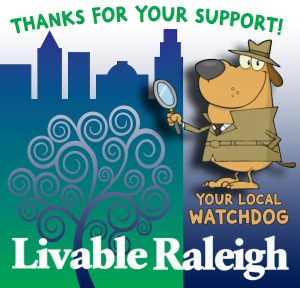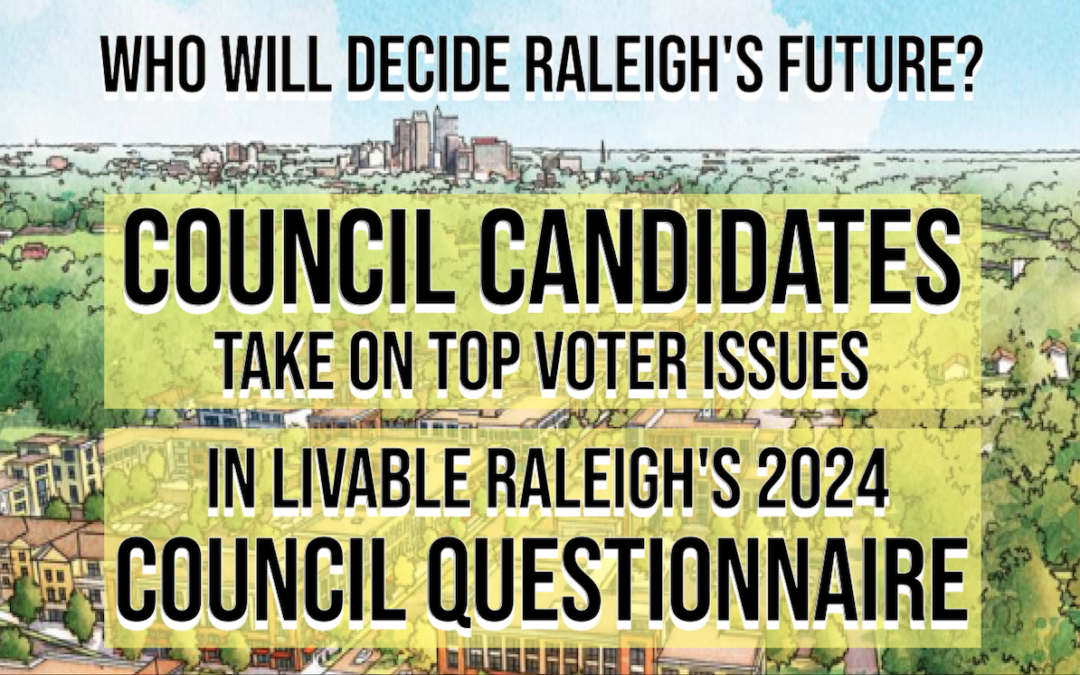How will Raleigh candidates respond to Livable Raleigh’s questionnaire of voter concerns, including the declining confidence in Council and the rising pain of growth impacts?
Our candidate questionnaire focuses on these and other key issues and trends identified in our 2022 and 2024 polling of registered voters and input from the public.
The questions below have been submitted to all candidates and we will publish their responses in early September.
Livable Raleigh believes that engaging voters and candidates in open and honest conversation about these questionnaire issues will build trust with voters and produce broadly supported ideas and leaders for Raleigh’s future.
Restoring Confidence in Council
Q1: Declining confidence in Council marked one of the 2024 poll’s biggest changes from 2022. In the new PPP poll, 73% of voters said the city does not do a good job of keeping residents informed, up substantially from 49% in 2022. Do you agree or disagree with this growing voter perception, and why?
Q2: Related to keeping residents informed, the city’s plans to close South Street, relocate Red Hat Amphitheater and expand the Convention Center are generating debate in the news and social media on two points: First, why does this seem to be a done deal, without first having a broader public debate about whether extending the 2005 vision of downtown makes post-covid sense? Second, does shoe-horning the relocated amphitheater one block over and closing South Street make sense, when the city already has plans to build a better amphitheater complex in Dix Park?
Q3: As in the 2022 PPP poll, influence of special interests is still a big concern, with 71% of 2024 voters saying the city is still too beholden to developers. Do you agree or disagree with this voter perception, and why?
Q4: Given voter concern about the undue influence of money in politics, will you pursue legislative authority to cap Council campaign individual donor amounts, similar to other nearby towns? If not, why? If so, what cap would you propose?
Q5: PPP’s recent citywide poll shows only 23% of voters approve of Council doubling their terms from two to four years in 2026. Do you agree with the voter preference to keep two year Council terms? Before deciding, should Council have first put that question to a voter referendum on the November 2024 election ballot? If not, why?
Q6: Speaking of election changes, the 2021 Council secretly partnered with the Legislature to give themselves an extra year in office and eliminate elections by voter majority. Gov. Cooper publicly criticized Council for changing the time and manner of their own election with no public input and no public vote. Do you think Cooper’s criticism represents a failure of Council’s ethical responsibility to Raleigh residents? If not, why?
Empowering Residents
Q7: 74% of Raleigh voters said neighborhood rezoning meetings should be returned from developer control to Citizen Advisory Councils (CACs). Do you agree or disagree with voters that CACs, and not developers, should control neighborhood rezoning meetings, and why?
Q8: Council recently restored partial support for CACs that survived Council’s 2020 defunding but has taken no effective action to restore inactive CACs, mostly in minority neighborhoods. In keeping with Raleigh voters’ strong support for CAC participation in neighborhood rezoning meetings, what actions will you take to restore and improve inactive CACs, especially in minority neighborhoods?
Q9: For 50+ years, CACs have been Raleigh’s only regularly scheduled, grass roots led, neighborhood based forum to share the full range of neighborhood quality of life issues with each other and with Council. In addition to restoring inactive CACs, will you commit to restoring support eliminated in 2020: preferred monthly meeting space, meeting technology support and city website support? If not, why?
Q10: Given voters’ 73% dissatisfaction with the city’s job of keeping them informed, and the voters’ 74% opposition to current neighborhood rezoning deliberations, will you support restoring and improving the longstanding, successful partnership between CACs and the city’s Housing and Neighborhoods Department? If not, why?
Improving the City Budget Process
Q11: In PPP’s recent citywide poll, only 1 in 4 voters said this year’s city budget reflects their priorities. What would you do to improve voter satisfaction with future city budgets?
Q12: Over the past several years Council has voted the City Manager large raises without any objective evaluation of performance goals against actual performance. If re/elected will you agree to establish and publish objective performance goals for the Manager as part of the city’s Strategic Plan and, if allowable, make your objective evaluation public before the Manager’s annual salary deliberations? If not, why?
Q13: Continuing with budgets, what are the top specific budget changes Council should make now or in the near future and how would you ensure city funding is fairly distributed across the city?
Q14: Public Safety funding concerns include employee compensation, the need for non-police emergency response teams and police misconduct settlements. What are your thoughts on these topics?
Mitigating Growth Impacts
Q15: Related to declining voter confidence, 2024 voters said growth impacts are increasing. According to the new PPP poll, 76% of voters say Raleigh’s infrastructure is not keeping up with growth, up from 65% in 2022. Do you agree or disagree with this growing voter perception, and why? If you agree, what should Council do about it?
Q16: Likewise, 58% of voters polled recently said growth comes at the expense of their quality of life, up from 44% in 2022. Do you agree or disagree with the voter perception that growth is hurting their quality of life, and why? If you agree, what will you do about it?
Q17: Council’s Missing Middle rules, intended to increase multi-unit housing in non- HOA single family neighborhoods, have been widely criticized and generated lawsuits. PPP’s citywide poll shows only 29% of voters support these new neighborhood densification rules. Criticisms include failing to inform the public about rules affecting their most important investment and enacting rules promoting market profitability at the expense of best practices incentivizing affordability, neighborhood compatibility and walkable access to transit. Are these criticisms valid? If not, why? If so, what would you do to restore voter confidence in Council?
Q18: Raleigh’s Area Plan growth policies and zoning districts regulations for neighborhood preservation (HODs) and conservation (NCODs) are the products of thoughtful public processes. Acknowledging that policies and regulations change over time, will you commit to abide by these plans and regulations unless they are changed as part of a city-sanctioned public process?
Expanding Affordable Housing
Q19: Most observers agree that Raleigh’s highly ranked growth rate has increased the cost of living in Raleigh, with low and fixed income households being especially hard hit. According to the new PPP poll, the citywide decline in affordable housing was the top concern by more than a 3 to 1 margin over all other issues including traffic, safety and taxes. Further, 66% of voters say Raleigh is failing its low-income and minority communities and almost 70% of those with an opinion said growth is destroying neighborhoods and forcing residents out of town. Given the strong voter sentiment that current efforts are not keeping up with Raleigh’s deepening affordable housing crisis, rank by impact the changes you would enact – beyond existing programs, funding, regulations and partnerships – if re/elected to Council? What measurable goals and performance tracking would you set so the public can hold Council and staff accountable on this top issue?
Improving our Environment
Q20: What are the most important environmental and climate protection challenges facing Raleigh and if re/elected, what new or expanded initiatives will you enact to overcome them?
Q21: Promoting urban densities can conflict with environmental protection, such as the recent Strickland Road watershed rezoning and clearcutting forested land, including infill and teardown lots. What are your key considerations for deciding if the growth benefits of a project outweigh environmental impacts?
National Question
Q22: Was the 2020 presidential election decided fairly or not?
If you appreciate the kind of reporting we bring to you
|
Please donate $10 or $20, Thanks for supporting |
 |

